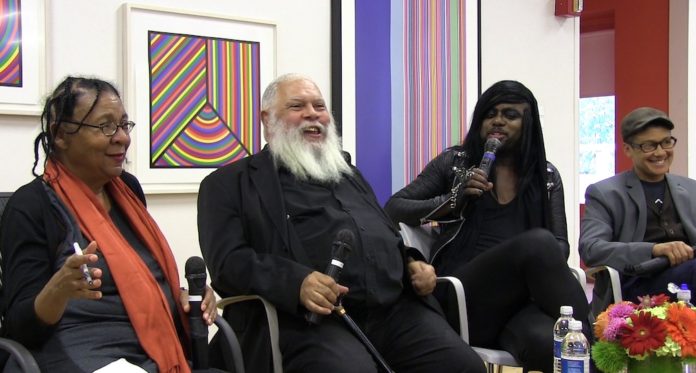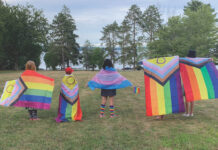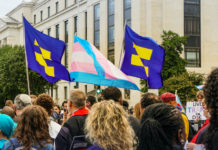
bell hooks died in Kentucky on December 15, 2021, at 69. As an Affrilachian (Black Appalachian), bell hooks was inarguably one of the nation’s prominent feminist scholars and authors. Time’s 100 Women of the Year for 2020 called our sister-friend a “rare rock star of a public intellectual.” hooks was born Gloria Jean Watkins and later took the pen name “bell hooks” from her great grandmother, Bell Blair Hooks.
bell hooks had legions of followers, especially women and the LGBTQ+ community, because her body of works profoundly changed the lives of so many of us. Laverne Cox is one. Laverne Cox and hooks had a deep sister-friendship and admiration for each other. hooks called Cox a “goddess for justice.” A tribute to bell hooks, Cox wrote on Instagram the following:
“bell hooks has always been the truth. Now perhaps more than ever, it’s paramount that we lean into her work. On this day of her passing, let us celebrate the rich published legacy she leaves behind.”
bell hooks was a huge inspiration to me, too. bell hooks identified as “queer-pas-gay” and paved the way for “Intersectional Feminism,” inspiring generations of women and LGBTQ+ people. Because of bell hooks, my life’s work is grounded in an intersectional anti-oppression activism and praxis.
I met bell in 1994 while I was a doctoral student at Harvard Divinity School when she came to Cambridge promoting her book “Outlaw Culture.” She was engaging, relatable, and was an instant sister-friend you could lollygag with for hours. We kept in touch through the years because she thought it was bold of me to be an openly black lesbian in the church and at HDS. I shared with her that I wanted to do a public theology, meeting the unchurched LGBTQ+ community on the pages of gay weeklies. Before the internet, I would send her a few of my columns.
Few have changed and challenged feminism like bell hooks. In “Teaching to Transgress,” bell hooks challenged the feminist movement to incorporate women beyond the educated and the academy. As an African lesbian minister, theologian, and multimedia journalist, I take theology to the streets. bell hooks’ body of work has assisted me in shaping both a local and national affirming public dialogue on religion and social justice issues about women and LGBTQ+ people.
“In Feminist Theory: From Margin to Center,” bell hooks states that she begins her analysis at the margin because it is a space of radical openness, and it gives you an oppositional gaze from which to see the world, unknown to the oppressor. It is at the margin where you can see injustice being done. It is not only a site where you can honestly critique the oppressive structures in society that keeps us wounded as a people, but it is also a site that can heal us as a people — both the oppressed and the oppressor.
I’ve learned from bell hooks in “All About Love: New Visions” that love is a verb, not a noun, requiring action, responsibility, and accountability to others. Love is about radical inclusion, and it must not be intellectualized but rather connected deeply with our need for personal healing; thus, challenging us to heal our “isms.” We must address deep-seated biases that impede authentic, respectful, and enriching relationships. And radical inclusion can only begin to work when those relegated to the fringes of society can begin to sample what those in society take for granted as their inalienable right.
bell was a controversial person. Among her peers in the academy, she was charming and challenging, admired and envied. Among students, friends, and fans, bell was simply loved. However, bell was equally as profound as she was provocative. For example, bell didn’t use footnotes in her writings, attributing her ideas to no one. She called Beyonce a “terrorist” because of Bey’s depiction of feminism and black women in her 2016 studio album “Lemonade.” And bell penned some pieces many feminists still are scratching their heads about-“Penis Passion” and “Selling Hot Pussy.” All in all, however, bell’s body of work is impressive.
bell hooks taught at several colleges and universities across the country. However, when hooks decided to return home to Kentucky, she opted to teach at Berea College. This liberal arts college offers free tuition and is the first interracial and coeducational college in the South. At Berea, hooks was the Distinguished Professor in Residence in Appalachian Studies and the founder of the bell hooks Institute that will continue her life’s work and mission.
Like so many, I’ll miss bell hooks. I loved bell hooks’ unquiet intellectual energy, her revolutionizing spirit, and her radical love for change. Heartbroken doesn’t aptly depict the enormity of bell hooks’ passing.
May our sister-friend rest in peace and power!
Rev. Irene Monroe can be heard on the podcast and standing Boston Public Radio segment “All Rev’d Up” on WGBH (89.7 FM), the Boston affiliate of NPR. Monroe’s syndicated religion columns appear in Bay Windows, Cambridge Chronicle, Dig Boston, Curve and in several cities across the country and in the UK and Canada.
Not a subscriber? Sign up today for a free subscription to Boston Spirit magazine, New England’s premier LGBT magazine. We will send you a copy of Boston Spirit 6 times per year and we never sell/rent our subscriber information. Click HERE to sign up!








